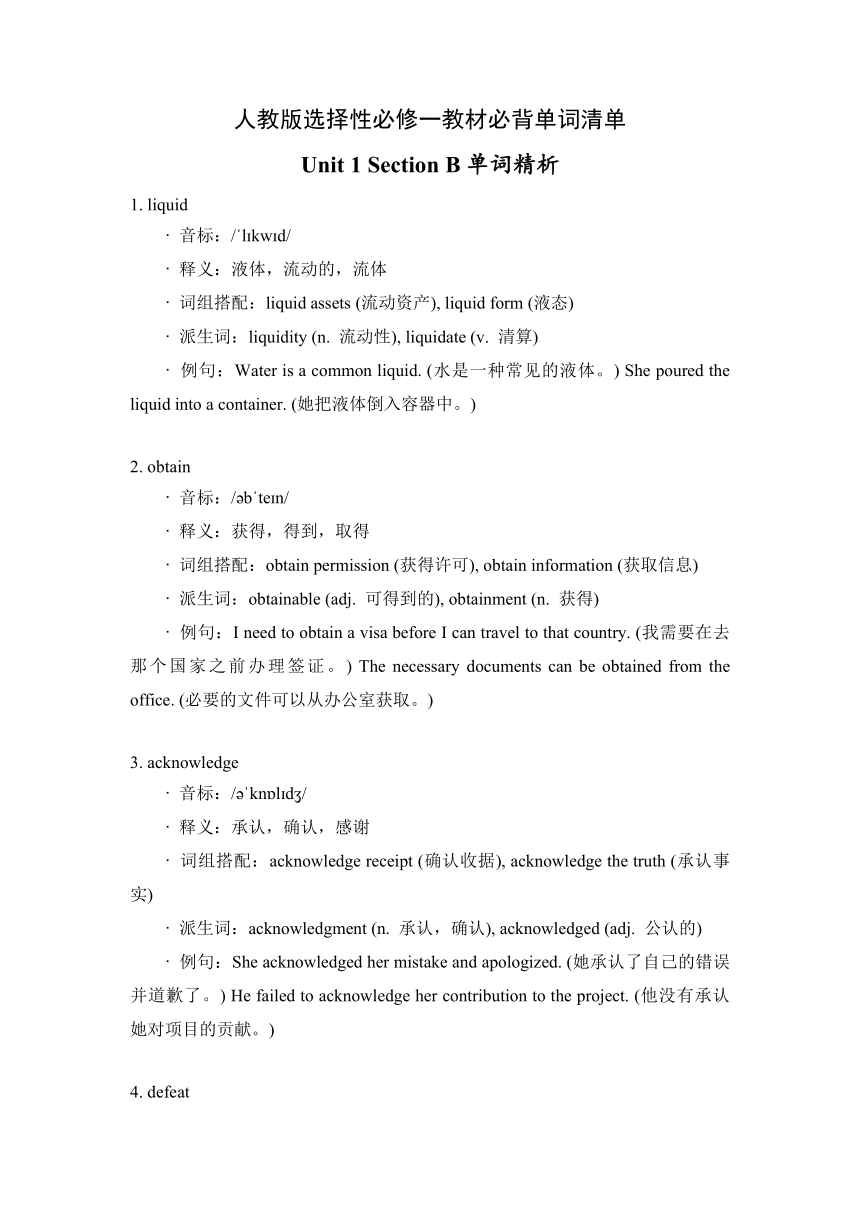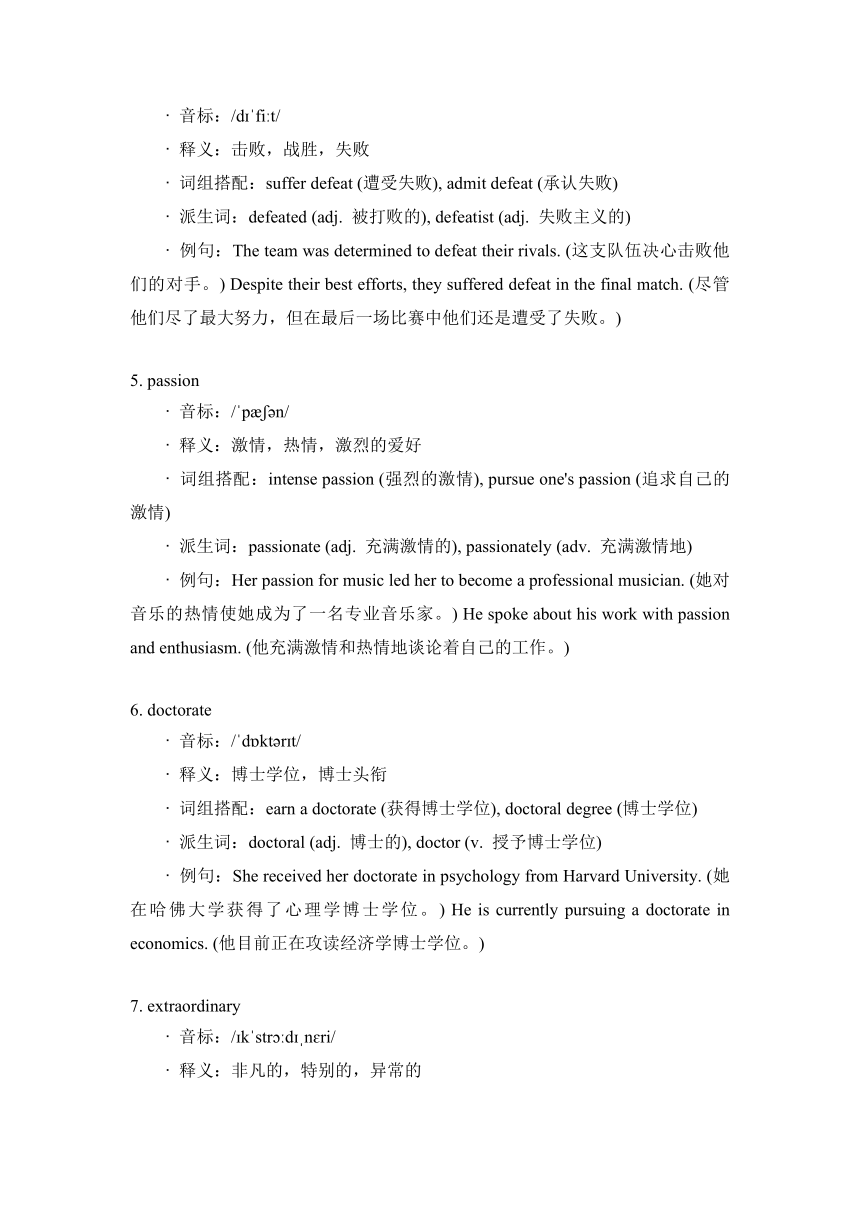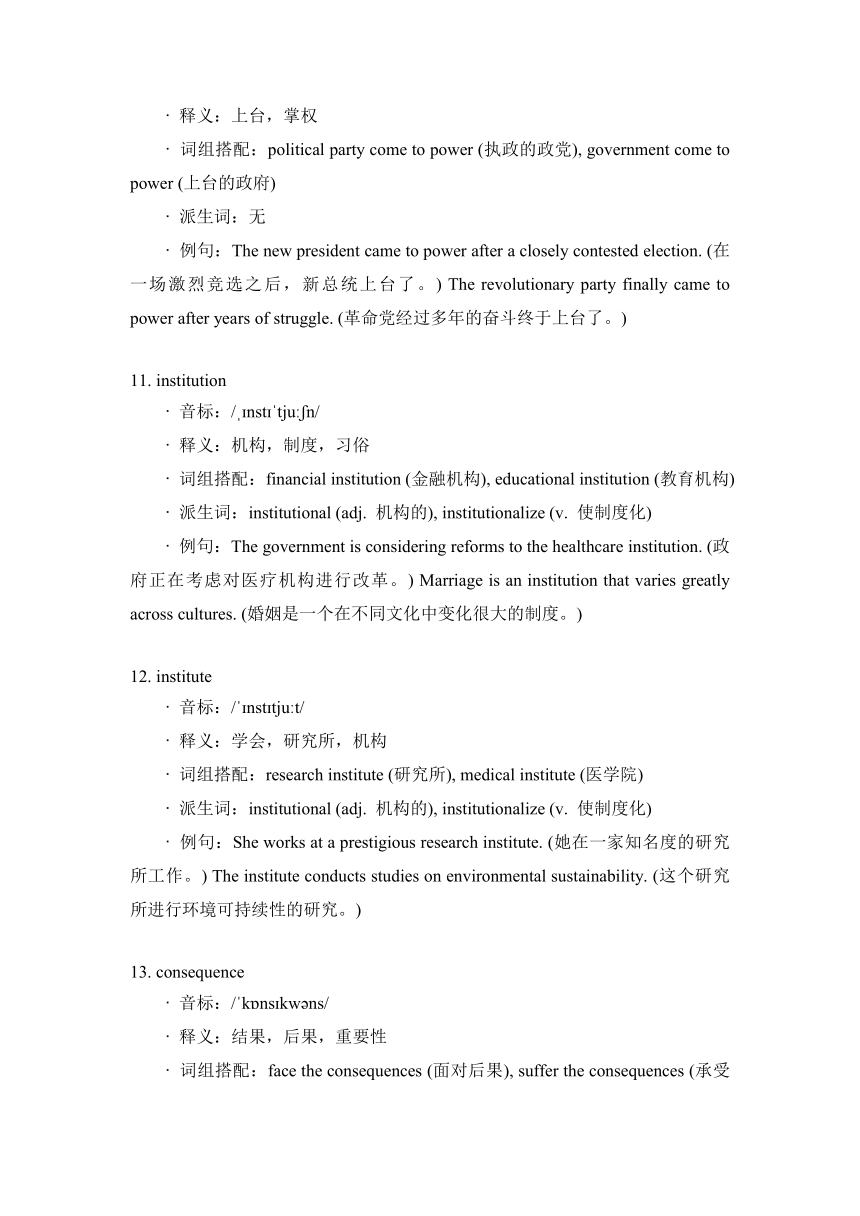人教版(2019)选择性必修第一册Unit 1 People of Achievement 单词精析 讲义
文档属性
| 名称 | 人教版(2019)选择性必修第一册Unit 1 People of Achievement 单词精析 讲义 |

|
|
| 格式 | docx | ||
| 文件大小 | 39.1KB | ||
| 资源类型 | 教案 | ||
| 版本资源 | 人教版(2019) | ||
| 科目 | 英语 | ||
| 更新时间 | 2024-04-24 00:00:00 | ||
图片预览




文档简介
人教版选择性必修一教材必背单词清单
Unit 1 Section B单词精析
1. liquid
· 音标:/ l kw d/
· 释义:液体,流动的,流体
· 词组搭配:liquid assets (流动资产), liquid form (液态)
· 派生词:liquidity (n. 流动性), liquidate (v. 清算)
· 例句:Water is a common liquid. (水是一种常见的液体。) She poured the liquid into a container. (她把液体倒入容器中。)
2. obtain
· 音标:/ b te n/
· 释义:获得,得到,取得
· 词组搭配:obtain permission (获得许可), obtain information (获取信息)
· 派生词:obtainable (adj. 可得到的), obtainment (n. 获得)
· 例句:I need to obtain a visa before I can travel to that country. (我需要在去那个国家之前办理签证。) The necessary documents can be obtained from the office. (必要的文件可以从办公室获取。)
3. acknowledge
· 音标:/ kn l d /
· 释义:承认,确认,感谢
· 词组搭配:acknowledge receipt (确认收据), acknowledge the truth (承认事实)
· 派生词:acknowledgment (n. 承认,确认), acknowledged (adj. 公认的)
· 例句:She acknowledged her mistake and apologized. (她承认了自己的错误并道歉了。) He failed to acknowledge her contribution to the project. (他没有承认她对项目的贡献。)
4. defeat
· 音标:/d fi t/
· 释义:击败,战胜,失败
· 词组搭配:suffer defeat (遭受失败), admit defeat (承认失败)
· 派生词:defeated (adj. 被打败的), defeatist (adj. 失败主义的)
· 例句:The team was determined to defeat their rivals. (这支队伍决心击败他们的对手。) Despite their best efforts, they suffered defeat in the final match. (尽管他们尽了最大努力,但在最后一场比赛中他们还是遭受了失败。)
5. passion
· 音标:/ p n/
· 释义:激情,热情,激烈的爱好
· 词组搭配:intense passion (强烈的激情), pursue one's passion (追求自己的激情)
· 派生词:passionate (adj. 充满激情的), passionately (adv. 充满激情地)
· 例句:Her passion for music led her to become a professional musician. (她对音乐的热情使她成为了一名专业音乐家。) He spoke about his work with passion and enthusiasm. (他充满激情和热情地谈论着自己的工作。)
6. doctorate
· 音标:/ d kt r t/
· 释义:博士学位,博士头衔
· 词组搭配:earn a doctorate (获得博士学位), doctoral degree (博士学位)
· 派生词:doctoral (adj. 博士的), doctor (v. 授予博士学位)
· 例句:She received her doctorate in psychology from Harvard University. (她在哈佛大学获得了心理学博士学位。) He is currently pursuing a doctorate in economics. (他目前正在攻读经济学博士学位。)
7. extraordinary
· 音标:/ k str d n ri/
· 释义:非凡的,特别的,异常的
· 词组搭配:extraordinary talent (非凡的才能), extraordinary circumstances (特殊情况)
· 派生词:extraordinarily (adv. 非常地), extraordinariness (n. 非凡)
· 例句:It was an extraordinary achievement for someone so young. (对于一个如此年轻的人来说,这是一个非凡的成就。) The storm caused extraordinary damage to the coastal area. (风暴给沿海地区造成了异常严重的破坏。)
8. gradually
· 音标:/ ɡr d u li/
· 释义:逐渐地,渐渐地
· 词组搭配:gradually improve (逐渐改善), gradually increase (逐渐增加)
· 派生词:gradual (adj. 逐渐的), gradualism (n. 渐进主义)
· 例句:The patient's condition is gradually improving. (病人的情况正在逐渐好转。) The company plans to gradually increase its workforce over the next year. (公司计划在接下来的一年逐渐增加其员工人数。)
9. photoelectric
· 音标:/ f t l ktr k/
· 释义:光电的
· 词组搭配:photoelectric effect (光电效应), photoelectric sensor (光电传感器)
· 派生词:photoelectricity (n. 光电效应)
· 例句:Photoelectric cells are commonly used in solar panels to convert sunlight
into electricity. (光电池常用于太阳能电池板中,将阳光转化为电能。) The photoelectric effect is the phenomenon where electrons are emitted from a material when it is exposed to light. (光电效应是当材料暴露在光线下时,电子从材料中发射出来的现象。)
e to power
· 音标:/k m tu pa (r)/
· 释义:上台,掌权
· 词组搭配:political party come to power (执政的政党), government come to power (上台的政府)
· 派生词:无
· 例句:The new president came to power after a closely contested election. (在一场激烈竞选之后,新总统上台了。) The revolutionary party finally came to power after years of struggle. (革命党经过多年的奋斗终于上台了。)
11. institution
· 音标:/ nst tju n/
· 释义:机构,制度,习俗
· 词组搭配:financial institution (金融机构), educational institution (教育机构)
· 派生词:institutional (adj. 机构的), institutionalize (v. 使制度化)
· 例句:The government is considering reforms to the healthcare institution. (政府正在考虑对医疗机构进行改革。) Marriage is an institution that varies greatly across cultures. (婚姻是一个在不同文化中变化很大的制度。)
12. institute
· 音标:/ nst tju t/
· 释义:学会,研究所,机构
· 词组搭配:research institute (研究所), medical institute (医学院)
· 派生词:institutional (adj. 机构的), institutionalize (v. 使制度化)
· 例句:She works at a prestigious research institute. (她在一家知名度的研究所工作。) The institute conducts studies on environmental sustainability. (这个研究所进行环境可持续性的研究。)
13. consequence
· 音标:/ k ns kw ns/
· 释义:结果,后果,重要性
· 词组搭配:face the consequences (面对后果), suffer the consequences (承受后果)
· 派生词:consequential (adj. 重要的), consequently (adv. 因此)
· 例句:His decision had serious consequences for the company. (他的决定对公司产生了严重的后果。) Environmental pollution is a consequence of industrialization. (环境污染是工业化的结果。)
14. take up a position
· 音标:/te k p p z n/
· 释义:就任,担任职务,站立
· 词组搭配:take up a leadership position (担任领导职务), take up a defensive position (采取防御姿态)
· 派生词:无
· 例句:She was offered a job and decided to take up the position. (她得到了一份工作,并决定担任这个职位。) The soldiers took up their positions along the border. (士兵们沿着边界采取了防守姿态。)
15. moustache
· 音标:/m stɑ /
· 释义:胡须,髭
· 词组搭配:thick moustache (浓密的胡须), grow a moustache (留胡须)
· 派生词:无
· 例句:He sported a thick moustache that covered his upper lip. (他留着一把浓密的胡须,遮住了他的上唇。) It took him several months to grow a full moustache. (他花了几个月的时间才留出一整把胡须。)
16. peculiarity
· 音标:/p kju l r ti/
· 释义:特点,特性,怪癖
· 词组搭配:cultural peculiarity (文化特点), personal peculiarity (个人怪癖)
· 派生词:peculiar (adj. 特有的,独特的), peculiarly (adv. 独特地)
· 例句:One of the peculiarities of the English language is its spelling. (英语的一个特点是其拼写方式。) His peculiarities made him stand out from the crowd. (他的怪癖使他脱颖而出。)
17. encounter
· 音标:/ n ka nt (r)/
· 释义:遭遇,邂逅,遇到
· 词组搭配:chance encounter (偶遇), unexpected encounter (意外相遇)
· 派生词:encounter (n. 遭遇,邂逅), encounter (v. 遭遇,遇到)
· 例句:They had a chance encounter in the park. (他们在公园里偶然相遇了。) He encountered many difficulties during his journey. (他在旅途中遇到了许多困难。)
18. professor
· 音标:/pr fes (r)/
· 释义:教授,大学教师
·
词组搭配:associate professor (副教授), assistant professor (助理教授)
· 派生词:professorial (adj. 教授的), professorship (n. 教授职位)
· 例句:She is a professor of economics at the university. (她是大学里的一名经济学教授。) The professor gave a lecture on quantum mechanics. (教授讲解了量子力学。)
19. mourn
· 音标:/m n/
· 释义:哀悼,悲痛,哀悼
· 词组搭配:mourn the loss (哀悼损失), mourn the dead (为死者哀悼)
· 派生词:mourning (n. 哀悼), mourner (n. 哀悼者)
· 例句:The nation mourned the death of its leader. (全国哀悼其领导人的去世。) She was still mourning the loss of her beloved pet. (她仍在哀悼她心爱的宠物的离世。)
20. remarkable
· 音标:/r mɑ k bl/
· 释义:卓越,杰出的,非凡的
· 词组搭配:remarkable achievement (卓越成就), remarkable progress (显著进步)
· 派生词:remarkably (adv. 非常地,显著地), remarkableness (n. 卓越)
· 例句:Her recovery after surgery was remarkable. (手术后她的康复情况非常好。) It's remarkable how quickly he learns new languages. (他学新语言的速度非常快,令人惊讶。)
21. device
· 音标:/d va s/
· 释义:设备,装置,方法
· 词组搭配:electronic device (电子设备), medical device (医疗器械)
· 派生词:deviceful (adj. 有设备的,巧妙的), deviser (n. 设计者)
· 例句:The new device allows users to monitor their heart rate. (这种新设备允许用户监测他们的心率。) She invented a device to help people with limited mobility. (她发明了一种帮助行动不便的人的设备。)
22. sum
· 音标:/s m/
· 释义:总和,总计,要点
· 词组搭配:total sum (总和), large sum (大笔款项)
· 派生词:summation (n. 总和), summarize (v. 总结)
· 例句:The sum of all the parts equals the whole. (部分的总和等于整体。) She received a large sum of money as an inheritance. (她继承了一大笔钱。)
23. draft
· 音标:/drɑ ft/
· 释义:草稿,起草,征召
· 词组搭配:write a draft (写草稿), military draft (征兵)
· 派生词:drafting (n. 草拟), drafter (n. 起草人)
· 例句:He wrote a draft of the speech before the event. (活动前他写了一份演讲草稿。) The government announced a military draft to increase troop numbers. (政府宣布征兵以增加部队人数。)
24. liquid
· 音标:/ l kw d/
· 释义:液体,流动的,流体
· 词组搭配:liquid assets (流动资产), liquid form (液态)
· 派生词:liquidity (n. 流动性), liquidate (v. 清算)
· 例句:Water is a common liquid. (水是一种常见的液体。) She poured the liquid into a container. (她把液体倒入容器中。)
25. obtain
· 音标:/ b te n/
· 释义:获得,得到,取得
· 词组搭配:obtain permission (获得许可), obtain information (获取信息)
· 派生词:obtainable (adj. 可得到的), obtainment (n. 获得)
· 例句:I need to obtain a visa before I can travel to that country. (我需要在去那个国家之前办理签证。) The necessary documents can be obtained from the office. (必要的文件可以从办公室获取。)
26. acknowledge
· 音标:/ kn l d /
· 释义:承认,确认,感谢
· 词组搭配:acknowledge receipt (确认收据), acknowledge the truth (承认事实)
· 派生词:acknowledgment (n. 承认,确认), acknowledged (adj. 公认的)
· 例句:She acknowledged her mistake and apologized. (她承认了自己的错误并道歉了。) He failed to acknowledge her contribution to the project. (他没有承认她对项目的贡献。)
Unit 1 Section B单词精析
1. liquid
· 音标:/ l kw d/
· 释义:液体,流动的,流体
· 词组搭配:liquid assets (流动资产), liquid form (液态)
· 派生词:liquidity (n. 流动性), liquidate (v. 清算)
· 例句:Water is a common liquid. (水是一种常见的液体。) She poured the liquid into a container. (她把液体倒入容器中。)
2. obtain
· 音标:/ b te n/
· 释义:获得,得到,取得
· 词组搭配:obtain permission (获得许可), obtain information (获取信息)
· 派生词:obtainable (adj. 可得到的), obtainment (n. 获得)
· 例句:I need to obtain a visa before I can travel to that country. (我需要在去那个国家之前办理签证。) The necessary documents can be obtained from the office. (必要的文件可以从办公室获取。)
3. acknowledge
· 音标:/ kn l d /
· 释义:承认,确认,感谢
· 词组搭配:acknowledge receipt (确认收据), acknowledge the truth (承认事实)
· 派生词:acknowledgment (n. 承认,确认), acknowledged (adj. 公认的)
· 例句:She acknowledged her mistake and apologized. (她承认了自己的错误并道歉了。) He failed to acknowledge her contribution to the project. (他没有承认她对项目的贡献。)
4. defeat
· 音标:/d fi t/
· 释义:击败,战胜,失败
· 词组搭配:suffer defeat (遭受失败), admit defeat (承认失败)
· 派生词:defeated (adj. 被打败的), defeatist (adj. 失败主义的)
· 例句:The team was determined to defeat their rivals. (这支队伍决心击败他们的对手。) Despite their best efforts, they suffered defeat in the final match. (尽管他们尽了最大努力,但在最后一场比赛中他们还是遭受了失败。)
5. passion
· 音标:/ p n/
· 释义:激情,热情,激烈的爱好
· 词组搭配:intense passion (强烈的激情), pursue one's passion (追求自己的激情)
· 派生词:passionate (adj. 充满激情的), passionately (adv. 充满激情地)
· 例句:Her passion for music led her to become a professional musician. (她对音乐的热情使她成为了一名专业音乐家。) He spoke about his work with passion and enthusiasm. (他充满激情和热情地谈论着自己的工作。)
6. doctorate
· 音标:/ d kt r t/
· 释义:博士学位,博士头衔
· 词组搭配:earn a doctorate (获得博士学位), doctoral degree (博士学位)
· 派生词:doctoral (adj. 博士的), doctor (v. 授予博士学位)
· 例句:She received her doctorate in psychology from Harvard University. (她在哈佛大学获得了心理学博士学位。) He is currently pursuing a doctorate in economics. (他目前正在攻读经济学博士学位。)
7. extraordinary
· 音标:/ k str d n ri/
· 释义:非凡的,特别的,异常的
· 词组搭配:extraordinary talent (非凡的才能), extraordinary circumstances (特殊情况)
· 派生词:extraordinarily (adv. 非常地), extraordinariness (n. 非凡)
· 例句:It was an extraordinary achievement for someone so young. (对于一个如此年轻的人来说,这是一个非凡的成就。) The storm caused extraordinary damage to the coastal area. (风暴给沿海地区造成了异常严重的破坏。)
8. gradually
· 音标:/ ɡr d u li/
· 释义:逐渐地,渐渐地
· 词组搭配:gradually improve (逐渐改善), gradually increase (逐渐增加)
· 派生词:gradual (adj. 逐渐的), gradualism (n. 渐进主义)
· 例句:The patient's condition is gradually improving. (病人的情况正在逐渐好转。) The company plans to gradually increase its workforce over the next year. (公司计划在接下来的一年逐渐增加其员工人数。)
9. photoelectric
· 音标:/ f t l ktr k/
· 释义:光电的
· 词组搭配:photoelectric effect (光电效应), photoelectric sensor (光电传感器)
· 派生词:photoelectricity (n. 光电效应)
· 例句:Photoelectric cells are commonly used in solar panels to convert sunlight
into electricity. (光电池常用于太阳能电池板中,将阳光转化为电能。) The photoelectric effect is the phenomenon where electrons are emitted from a material when it is exposed to light. (光电效应是当材料暴露在光线下时,电子从材料中发射出来的现象。)
e to power
· 音标:/k m tu pa (r)/
· 释义:上台,掌权
· 词组搭配:political party come to power (执政的政党), government come to power (上台的政府)
· 派生词:无
· 例句:The new president came to power after a closely contested election. (在一场激烈竞选之后,新总统上台了。) The revolutionary party finally came to power after years of struggle. (革命党经过多年的奋斗终于上台了。)
11. institution
· 音标:/ nst tju n/
· 释义:机构,制度,习俗
· 词组搭配:financial institution (金融机构), educational institution (教育机构)
· 派生词:institutional (adj. 机构的), institutionalize (v. 使制度化)
· 例句:The government is considering reforms to the healthcare institution. (政府正在考虑对医疗机构进行改革。) Marriage is an institution that varies greatly across cultures. (婚姻是一个在不同文化中变化很大的制度。)
12. institute
· 音标:/ nst tju t/
· 释义:学会,研究所,机构
· 词组搭配:research institute (研究所), medical institute (医学院)
· 派生词:institutional (adj. 机构的), institutionalize (v. 使制度化)
· 例句:She works at a prestigious research institute. (她在一家知名度的研究所工作。) The institute conducts studies on environmental sustainability. (这个研究所进行环境可持续性的研究。)
13. consequence
· 音标:/ k ns kw ns/
· 释义:结果,后果,重要性
· 词组搭配:face the consequences (面对后果), suffer the consequences (承受后果)
· 派生词:consequential (adj. 重要的), consequently (adv. 因此)
· 例句:His decision had serious consequences for the company. (他的决定对公司产生了严重的后果。) Environmental pollution is a consequence of industrialization. (环境污染是工业化的结果。)
14. take up a position
· 音标:/te k p p z n/
· 释义:就任,担任职务,站立
· 词组搭配:take up a leadership position (担任领导职务), take up a defensive position (采取防御姿态)
· 派生词:无
· 例句:She was offered a job and decided to take up the position. (她得到了一份工作,并决定担任这个职位。) The soldiers took up their positions along the border. (士兵们沿着边界采取了防守姿态。)
15. moustache
· 音标:/m stɑ /
· 释义:胡须,髭
· 词组搭配:thick moustache (浓密的胡须), grow a moustache (留胡须)
· 派生词:无
· 例句:He sported a thick moustache that covered his upper lip. (他留着一把浓密的胡须,遮住了他的上唇。) It took him several months to grow a full moustache. (他花了几个月的时间才留出一整把胡须。)
16. peculiarity
· 音标:/p kju l r ti/
· 释义:特点,特性,怪癖
· 词组搭配:cultural peculiarity (文化特点), personal peculiarity (个人怪癖)
· 派生词:peculiar (adj. 特有的,独特的), peculiarly (adv. 独特地)
· 例句:One of the peculiarities of the English language is its spelling. (英语的一个特点是其拼写方式。) His peculiarities made him stand out from the crowd. (他的怪癖使他脱颖而出。)
17. encounter
· 音标:/ n ka nt (r)/
· 释义:遭遇,邂逅,遇到
· 词组搭配:chance encounter (偶遇), unexpected encounter (意外相遇)
· 派生词:encounter (n. 遭遇,邂逅), encounter (v. 遭遇,遇到)
· 例句:They had a chance encounter in the park. (他们在公园里偶然相遇了。) He encountered many difficulties during his journey. (他在旅途中遇到了许多困难。)
18. professor
· 音标:/pr fes (r)/
· 释义:教授,大学教师
·
词组搭配:associate professor (副教授), assistant professor (助理教授)
· 派生词:professorial (adj. 教授的), professorship (n. 教授职位)
· 例句:She is a professor of economics at the university. (她是大学里的一名经济学教授。) The professor gave a lecture on quantum mechanics. (教授讲解了量子力学。)
19. mourn
· 音标:/m n/
· 释义:哀悼,悲痛,哀悼
· 词组搭配:mourn the loss (哀悼损失), mourn the dead (为死者哀悼)
· 派生词:mourning (n. 哀悼), mourner (n. 哀悼者)
· 例句:The nation mourned the death of its leader. (全国哀悼其领导人的去世。) She was still mourning the loss of her beloved pet. (她仍在哀悼她心爱的宠物的离世。)
20. remarkable
· 音标:/r mɑ k bl/
· 释义:卓越,杰出的,非凡的
· 词组搭配:remarkable achievement (卓越成就), remarkable progress (显著进步)
· 派生词:remarkably (adv. 非常地,显著地), remarkableness (n. 卓越)
· 例句:Her recovery after surgery was remarkable. (手术后她的康复情况非常好。) It's remarkable how quickly he learns new languages. (他学新语言的速度非常快,令人惊讶。)
21. device
· 音标:/d va s/
· 释义:设备,装置,方法
· 词组搭配:electronic device (电子设备), medical device (医疗器械)
· 派生词:deviceful (adj. 有设备的,巧妙的), deviser (n. 设计者)
· 例句:The new device allows users to monitor their heart rate. (这种新设备允许用户监测他们的心率。) She invented a device to help people with limited mobility. (她发明了一种帮助行动不便的人的设备。)
22. sum
· 音标:/s m/
· 释义:总和,总计,要点
· 词组搭配:total sum (总和), large sum (大笔款项)
· 派生词:summation (n. 总和), summarize (v. 总结)
· 例句:The sum of all the parts equals the whole. (部分的总和等于整体。) She received a large sum of money as an inheritance. (她继承了一大笔钱。)
23. draft
· 音标:/drɑ ft/
· 释义:草稿,起草,征召
· 词组搭配:write a draft (写草稿), military draft (征兵)
· 派生词:drafting (n. 草拟), drafter (n. 起草人)
· 例句:He wrote a draft of the speech before the event. (活动前他写了一份演讲草稿。) The government announced a military draft to increase troop numbers. (政府宣布征兵以增加部队人数。)
24. liquid
· 音标:/ l kw d/
· 释义:液体,流动的,流体
· 词组搭配:liquid assets (流动资产), liquid form (液态)
· 派生词:liquidity (n. 流动性), liquidate (v. 清算)
· 例句:Water is a common liquid. (水是一种常见的液体。) She poured the liquid into a container. (她把液体倒入容器中。)
25. obtain
· 音标:/ b te n/
· 释义:获得,得到,取得
· 词组搭配:obtain permission (获得许可), obtain information (获取信息)
· 派生词:obtainable (adj. 可得到的), obtainment (n. 获得)
· 例句:I need to obtain a visa before I can travel to that country. (我需要在去那个国家之前办理签证。) The necessary documents can be obtained from the office. (必要的文件可以从办公室获取。)
26. acknowledge
· 音标:/ kn l d /
· 释义:承认,确认,感谢
· 词组搭配:acknowledge receipt (确认收据), acknowledge the truth (承认事实)
· 派生词:acknowledgment (n. 承认,确认), acknowledged (adj. 公认的)
· 例句:She acknowledged her mistake and apologized. (她承认了自己的错误并道歉了。) He failed to acknowledge her contribution to the project. (他没有承认她对项目的贡献。)
